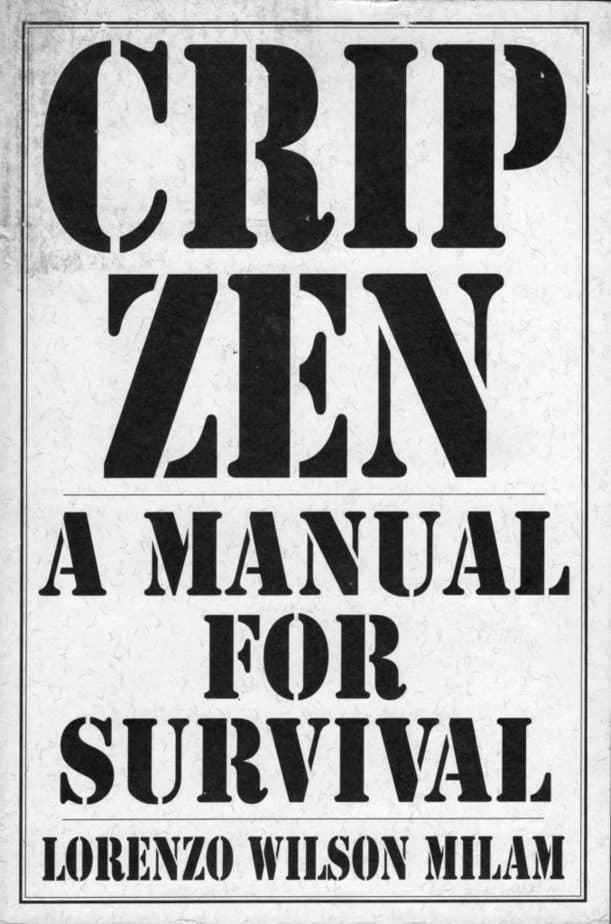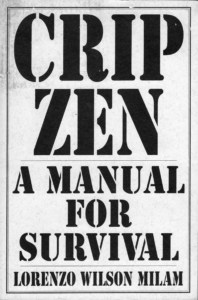
Once I wanted to write a book about being Crip. It was to tear away all the rhetoric, all the cant. I wanted to rip souls, to go beyond the uplift nonsense.
So I wrote a book, and it got published, read and reviewed. And now it is as if I never wrote it. The publisher still has 1,500 copies of it knocking about the garage. And I am still Crip. We don’t get cured by being honest and self-revealing.
Still, I realized recently, I have lasted a long time. And I am expert merely by surviving two score years in the non-Crip world. My old polio friends and I have come up with an army of insights about where we went, where we went wrong, where we are now, how we might have gotten there faster (and easier), and possibly, where we are heading. Robert Murphy, the master analyst of the sociological aspects of being Crip, once eyed a healthy young man running down the street, lovely in his fresh young body, and said, “There but for the Grace of God go I.”
If you ask me, the advice I have for the newly Crip, those who last week or last month or last year went to bed with one body and woke up with another — if you ask me what would be the best way to survive what Richard Brickner called, “My Second Twenty Years,” my advice would be simple:
1) Let being Crip work for you. Don’t fight it. Become it. Let its moves be your own.
What I am saying may make no sense to the non-Crip; the rest of you know what I am talking about, or are coming to learn what I am talking about. It even has a name. It is CripZen.
It is the sound of one palsied hand clapping. It is the paradoxical question that all Crips must ask themselves, “Why me?” And it is the equally paradoxical answer, propounded by Sheldon Kopp, “Why not?”
It is falling — falling down the walkway, falling out of the chair, falling off the toilet — and knowing that our particular fall means little to the gods who run our lives.
It hurts — it hurts our pride and it hurts our bodies, but it’s just pain and one man’s pain is no more important than any other’s.
That is CripZen and it is worth seeking. And it may well come without seeking, at least for those who survive long enough.
2) Get rid of the anger.
Get a shrink — someone who is sage in the area of loss-of-body. Spend time with him or her. Get the hell out of the most damaging part of it as quickly as possible. All us Crips have it, and it comes disguised in the most subtle and devious ways, to the point of our denying its very existence.
Know that all of life is made up of love and fear. Love breeds love, fear breeds anger. To lose something as crucial as The Body Normal creates fear.
Know that it’s there, and that it’s a waste.
3) Get out of the world they set up for you — the medical and social work establishments and our families. Get free.
The medical establishment puts us in situations that are convenient for the caretakers, the least bother to them, possibly the least attractive to us. That’s their movie: get out, if at all possible, of the nursing homes, the hospitals, the caretaking facilities, no matter what it takes.
And the family. Ay.
Because our families love us, they want to protect us emotionally, physically, socially. They want to put us in safe, orderly situations. They do it because they love us.
You have to teach yourself early on when kindness becomes suffocating. To divorce yourself from it, you will have to wrestle with the guilt and the hurt of your family, and your own guilt and hurt. It’s so powerful it can wrench all, you and them. But you must create an escape, even if you can’t get out the door.
It’s a battle that matches our battle to regain whatever physical parts of us we were able to salvage from the initial onslaught. It’s a crucial battle.
Be aware of it; fight it; win it. Be free.
Right now, I spend half of my time in my house, and much of it in bed. I am surrounded by friends and family and “help” — people who care for me, and care for me in a hundred different ways.
But I’m not always in this careful setting. As often as possible, I get out of this world, doing the damnedest things I can to create and maintain my freedom. I live half the year in another country, in another environment — well away from family and friends.
That’s life! It’s inconvenient. The houses where I go for the winter, the huts, really, have stairs, small doors. The access to the bathrooms is hideous. Nothing is Crip-approved; I have to piss in a grapefruit juice bottle. In one of the places, I need two or three people just to get me inside and propped up at the table. Another has no water, and another has water but no electricity. It can be extraordinarily uncomfortable — hot, dusty, fly-bitten and noisome. And yet …
When I am there, I am living. I am climbing my own special mountain, hiking my own special veldt, skiing my own special slope. I am living, by God — alive and full of my freedom; talking with my friends, laughing, getting drunk, being silly, getting free.
For those of you embarking on this career — and believe me, it’s a lifelong career, being Crip — get out, get rid of the baggage and, by all means, use what they have given you.
Use it. Carefully, not as a weapon, but as a tool. Like you would a car, money, brains.
And know that you are using it. Do it with acceptance (I almost wrote “humility” — but that is the wrong word.) Don’t be wasting your Cripdom on surliness, denial or blackmail, expressed or implied.
Use it for freedom and, as well, love.
Lorenzo Milam is the author of The Cripple Liberation Front Marching Band Blues, The Lourdes of Arizona and The Blob That Ate Oaxaca and Other Travel Tales. The above is an excerpt from the author’s 1993 book, CripZen.
Support New MobilityWait! Before you wander off to other parts of the internet, please consider supporting New Mobility. For more than three decades, New Mobility has published groundbreaking content for active wheelchair users. We share practical advice from wheelchair users across the country, review life-changing technology and demand equity in healthcare, travel and all facets of life. But none of this is cheap, easy or profitable. Your support helps us give wheelchair users the resources to build a fulfilling life. |


Recent Comments
Bill on LapStacker Relaunches Wheelchair Carrying System
Phillip Gossett on Functional Fitness: How To Make Your Transfers Easier
Kevin Hoy on TiLite Releases Its First Carbon Fiber Wheelchair